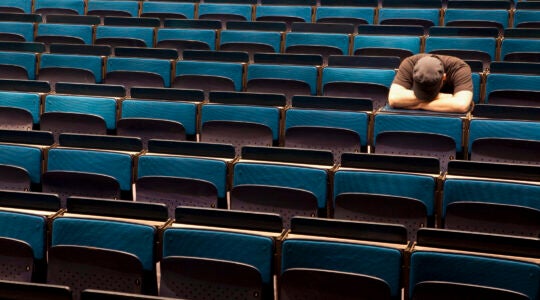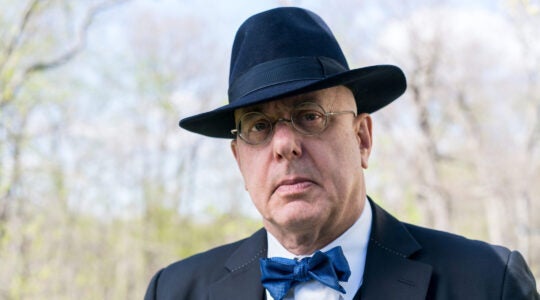For an American Jewry concerned with its relationship to the State of Israel, this week’s quincentenary of the Protestant Reformation provides an opportunity to consider tactical possibilities regarding another body of religious authority in desperate need of reform — the Chief Rabbinate of the State of Israel.
Tradition relates that on the eve of All Hallows Day 1517, Martin Luther posted his 95 theses on the door of the Wittenberg Chapel. The Catholic Church was the most powerful institution of its day, its reach extending across Europe with tremendous political and financial leverage over kings and emperors. Instead of serving the pious and poor, Luther saw a Church that had become a corrupt moneymaking machine in its taking of tithes, sale of church positions and worst of all, practice of “indulgences” — the remission of sins by way of payments to the Church. One need only consider the grandeur of Rome’s St. Peter’s Basilica, then in the process of being rebuilt, to understand how Luther came to believe that the Church had strayed from its core mission.
Luther, a priest and friar living in a German community bristling under the political domination of Rome, bore witness to this toxic marriage between religious and political power. In response, Luther sought a radical restructuring of the role of the Church — no longer the mediating institution between God and humanity. Most famously, Luther advocated the principle of Sola Scriptura, the idea that one could read scripture without the Church’s interpretive interference. These, among other claims, prompted a movement to democratize Christianity from its top-down papal formulation towards a “priesthood of all believers,” eventually giving rise to the Protestant Reformation.
The parallels between Luther’s 16th-century observations regarding the Catholic Church and the present-day sins of Israel’s Chief Rabbinate are striking. Moreover, the common backdrop provides an instructive historical precedent for American Jewry to issue a Luther-like call for the immediate dismantling of Israel’s central religious institution.
By way of background, it is important to note that unlike the church-state divisions of America, Israeli religious life is not only centralized in a Chief Rabbinate, but also sustained politically and financially by way of the state. While such a system may initially appear sensible to the degree that Israel is a Jewish state and should thus nurture national Jewish life, the situation on the ground has turned altogether toxic.
The story begins before Israel was even born in 1947 when, in order to win ultra-Orthodox support, the soon-to-be Prime Minister David Ben-Gurion entered into the “Status Quo Agreement,” in which he guaranteed that the Jewish state would take religious law into account on matters related to the Sabbath, dietary laws, personal status and religious education.
But what has happened in the 70 years since is beyond what Ben-Gurion could have ever imagined. The status quo agreement has expanded to include a variety of de jure and de facto arrangements, including the questions of “Who is a Jew?” conversion to Judaism, military conscription of the ultra-Orthodox, the funding of religious education, gender separation in the public sphere, marriage, divorce, burial and the production of a “blacklist” of non-ultra-Orthodox American rabbis including many of my colleagues (and probably, after this article, me).
The focus of American Jewry is often directed at efforts to ensure that our holiest site, Jerusalem’s Western Wall, remains accessible to the entire Jewish people — not just the ultra-Orthodox. Important as that battle is, it is really just the canary in the coal mine. No different than Luther’s day, American Jewry bristles in the face of a corrupt, state-funded chief rabbi who would arrogate upon himself the authority to determine who is and isn’t a Jew and what is and isn’t Judaism (the previous one is currently sitting in jail on charges of fraud and corruption). It is a state of affairs resulting in a growing divide between American Jewry and Israel that, if not tended to, will assuredly weaken the identity and security of both communities.
The situation is dire and deteriorating, and a call for action is clearly in order. Yet before American Jewry calls for the end of the Chief Rabbinate, we would do well to pause for a few considerations.
First and foremost, when picking battles, it is important to know that you are fighting the right fight. Dramatic as it may be to call the Chief Rabbinate to task, it should not be our only target. The power of the Chief Rabbinate is made possible by way of a prime minister beholden to it, a state of affairs made possible by way of Israel’s dysfunctional Knesset or parliamentary system. Every Israeli government is forced, as Ben-Gurion was in his day, to make all sorts of concessions to the ultra-Orthodox parties who are granted authority to run the table on all religious matters. The power of the Chief Rabbinate is a symptom, not a cause. The systemic issue in need of being addressed is Knesset politics, or, if one really wants to get to the heart of the matter — an Israeli electorate that has enabled the status quo to persist.
Second, on this fight, we would do well to note that confrontation is but one of many tactics. For those who really want change in Israel, investments must be made in those efforts seeking to nurture non-Orthodox expressions of Israeli life reflecting pluralistic Jewish values. The funding choices of American Jewry should be preceded by the question of whether an organization supports a Jewish expression reflecting a democratic vision of Jewish living. Eager as I am to see the Chief Rabbinate dismantled, there is also a long game to be played. The stranglehold it has on Israel will end only when Israelis themselves are fed up with it. As American Jews, we can be key partners in bringing that outcome to pass.
Finally, tempting as it may be to call for the dismantling of the Chief Rabbinate, such a pronouncement does not serve to strengthen the Judaism of American Jewry. The Chief Rabbinate and, for that matter, many secular Israelis run roughshod over American Jewry because they see us as a dying breed, and their attitude and actions speak to their belief that the writing is on the wall for us. If American Jewry wants to be taken seriously by Israel — we need to take ourselves seriously. In the words of Vince Lombardi: “The best defense is a good offense.” American Jewry can and should spend its time and money fighting the Chief Rabbinate. We should also invest in our own Judaism, build up our own communities and live lives as loving, literate, passion-filled Jews. American Jewry must not make the mistake of letting our skirmish with the Chief Rabbinate serve as a compensatory act for a paper-thin Jewish identity. Only an emboldened American Jewry will give the Chief Rabbinate a run for its money.
This week marks not just the 500th anniversary of the Protestant Reformation, but also the 100th anniversary of the signing of the Balfour Declaration, the historic document envisioning the establishment of a national home for the Jewish people. To live in a time when the Jewish homeland denies the right of all Jews to express their faith as they see fit is a bitterly ironic state of affairs that American Jewry should not countenance. American Jewry must fight the good and smart fight, working together to bring about the shared future that we so desperately deserve and desire.
Rabbi Elliot J. Cosgrove is the senior rabbi of Park Avenue Synagogue, Manhattan.
The New York Jewish Week brings you the stories behind the headlines, keeping you connected to Jewish life in New York. Help sustain the reporting you trust by donating today.





